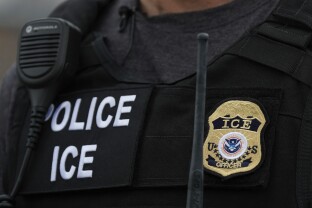New testimony revealed in federal court highlights a traumatic incident involving immigrant children over the weekend, in which the federal government woke up detained kids in the middle of the night in an attempt to quickly deport them to Guatemala.
Their experience mirrored another covert operation earlier this year, in which Trump administration officials rushed dozens of men to a prison in El Salvador.
A little girl at a children’s shelter in McAllen, Texas, “was so scared that she vomited and asked to speak with a clinician.”
At a foster care center elsewhere in the state, “one young girl was extremely distraught, crying and repeatedly saying that she could not go back to Guatemala.” In another, “one young teenager was scared that he might end up murdered like one of his family members.”
But unlike the previous episode in March, in which the Department of Homeland Security ignored a judge’s order to turn the deportation planes around, sparking a national debate over the sudden expulsion of men deemed “enemy aliens” without due process, this past weekend’s operation targeting children was interrupted by a federal judge who moved fast enough to stop it.
On Sunday in Washington, D.C., District Judge Sparkle L. Sooknanan rapidly issued a series of orders commanding the Trump administration to halt the deportations and broadly defined a “class” of people that it applied to.
Citing “exigent circumstances,” she ordered that the government “shall not transfer, repatriate, remove, or otherwise facilitate the transport” of the kids for two weeks.
And in a move that appeared to show the judge was applying the lessons learned from her colleague’s experience in March, when Justice Department lawyers who’d already been instructed to ignore judges’ orders stalled and held back from informing Chief Judge James Boasberg about the deportation plans, Sooknanan also demanded that federal lawyers provide her an immediate status update within hours. When they blew the deadline, she quickly followed up and demanded that they explain themselves.
But on Wednesday, documents filed in court revealed what the children experienced when the Trump administration tried to slip them onto deportation flights during the holiday weekend, when courts are generally closed save for emergencies.
One 17-year-old boy, who said he fled to the United States after growing up with a neglectful father who could not protect him from “the violence and the drug dealers” back in Guatemala, recounted how the supervisor at Compass Connections Harlingen Shelter woke him up at 2 a.m. Sunday with devastating news.
“I woke up very scared, and I felt like I lost my breath for a second because they had never woken us up in the middle of the night before. The supervisor told me we were going to leave and to get our things. I asked for an explanation, but they didn’t say why we were going to leave or where we were going. I started to pray to God because I was scared and wanted to stay in the shelter. I asked God to protect me and told him I would follow his will,” the boy recalled in a declaration signed with his initials, ARMD.
Lauren Fisher Flores, the legal director of the South Texas Pro Bono Asylum Representation Project, wrote her own signed declaration that described the way her organization’s staffers “witnessed children who had been pulled out of their beds.”
“They were confused and scared,” she wrote, describing how a girl at Hands of Healing in Los Fresnos, Texas, was crying and how another at New Hope Children’s Shelter in McAllen threw up from the stress.
In court on Sunday, government lawyers told the judge that these children actually wanted to return to Guatemala, a claim that Sooknanan found suspect. The new testimony submitted on Wednesday shows quite the opposite.
But the testimonies also show something else: What appears to be a government effort to contact — and at times, berate — the parents who allowed their children to flee to the United States to seek a better life.
Magaly Yaneth Vicente Sontay, a 36-year-old woman whose daughter is living with a foster family in Fresno, California, reasoned that her little girl was better off away from Guatemala and her husband, who beat them both. She explained that her family has experienced bullying and discrimination for being of Mayan descent — a long-running societal problem there that persists to this day and led to a military-run genocide in the 1980s. But her declaration also claimed that two weeks ago, a pair of women paid her a visit to criticize her decision.
“These women seemed angry and were reprimanding me. They told me I should not have sent my daughter to the United States,” she recalled.
In another declaration, a Guatemalan man whose name is redacted explained how his daughter has been living in New York since January 2023 to avoid the dangers back in her homeland. He recalled how he recently received “a strange phone call” from someone who told him in Spanish that the U.S. government was soon going to deport his daughter and wanted to know if he would receive her back.
“I was alarmed and extremely worried about my daughter after receiving this call,” he recalled.
Sign in
Log into your free account with your email. Don’t have one?
Check your email for a one-time code.
We sent a 4-digit code to . Enter the pin to confirm your account.
New code will be available in 1:00
Let’s try this again.
We encountered an error with the passcode sent to . Please reenter your email.


